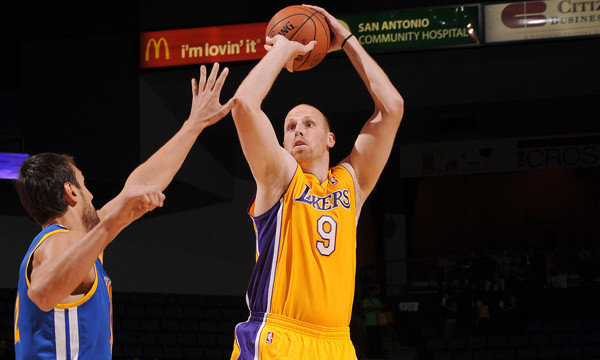“They don’t care because they’re already built to where they look good. They’re a freak show, they’re ripped, they’re lean and they can jump high, so they don’t care…”
These are the word of Chris Kamen, Los Angeles Lakers player, referring to how nearly 90 percent of NBA players do not eat properly or care about their bodies.
Kamen’s thoughts, along with many other NBA players’, were captured by NBA reporter Ken Berger in a three-part series running on CBS Sports this week. The first article in the series, titled Nutrition in the NBA: Part 1: Lessons Learned in L.A. Help Howard’s Career, closely follows Dwight Howard, former Laker now a Houston Rocket, and many of his former teammates as they undergo a major diet overhaul at the advisement of Dr. Cate Shanahan.
In a nutshell, Dr. Shanahan reports in the article that she watched Howard play in a Lakers’ game last season and while she saw a strong outer shell, what stuck out was how she could compare this professional athlete to a pre-diabetic patient. She said Howard looked like he was wearing oven mitts and she feared he was having a major neurological problem due to sugar intake. Her observations lead to Howard being her prime test subject for a diet change that she believed would improve the entire NBA.
Like Kamen referenced, most players do not care about what’s going into their bodies, because they look good, but Dr. Shanahan found in Howard that what he was putting in was very dangerous. After evaluating his diet, his sugar intake was equal to eating 24 Hershey bars a day! More proof that even on a professional athlete, you can’t judge a body’s health by its outward appearance (aka, a phenomenon known as skinny fat).
Howard and the entire team were encouraged to start following the rules from Dr. Shanahan’s book Deep Nutrition. Essentially, they started really cleaning up their diets by avoiding sugar, processed foods, and unhealthy oils. They started eating real foods, a lot of healthy fats, and grass-fed meat.
The result? The Lakers now have a name for their plan. It’s called PRO Nutrition (Performance, Recovery and Orthogenesis). Players boast that they’re recovering from injury faster, not feeling the soreness in joints like they were last season, and even Kobe Bryant, who has adopted most of the plan, stated in Berger’s article that he believes the diet promotes healing.
Additionally players are seeing weight loss, body fat reduction, and glucose levels dropping to healthy ranges.
Long gone are the days of these players toting around sugary drinks and cereal-based snack bars in their gym bags. In fact, Kamen showed off the kale chips and hazelnut butter from his bag during the interview.
These players are the minority among the NBA, but most are so pleased with the results they say they’ll never go back to their old style of eating. It seems arguable that these diets could prolong their careers and their longevity. But clearly, these steps are not reserved for the elite athlete. Cleaning up our diets and taking a stand against the sugar-loaded, over-processed concoctions we call food can only help each of us. If this takes off in the NBA, what a great platform for diet reform in our country. This gives a whole new meaning to the phrase “I want to be like a professional basketball player when I grow up.”
Also Read:
Kevin Durant’s Fitness Focus is as Likeable as He is
Dwyane Wade’s New Fitness App Driven
10 Breakfast Foods with as Much Sugar as a Candy Bar
image via lakernation.com

